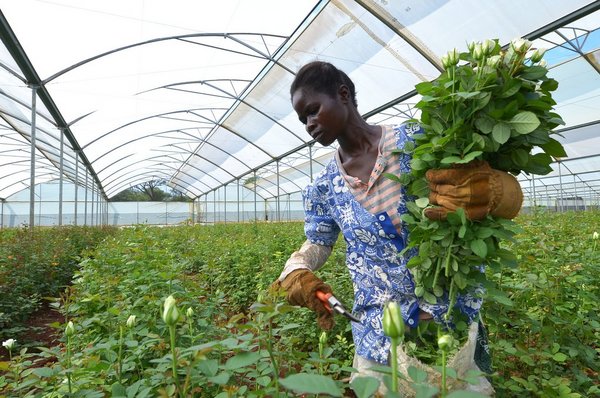- Share this article
- Subscribe to our newsletter
Impact of Fairtrade on flower workers
Fairtrade flowers workers in East Africa have higher wages, better working conditions and engage more in workers’ rights issues and gender equity than their non-Fairtrade certified counterparts, according to a new study published in February 2023.
The study, which is entitled Impact of Fairtrade on flower workers and market access of flower farms in East Africa, was conducted by Social Policy and Development Consulting Limited. It examines 11 producer organisations across Kenya, Uganda and Ethiopia, including nine Fairtrade certified, and two non-Fairtrade. It is informed by surveys and focus groups with more than 650 workers, as well as interviews with farm managers, Fairtrade staff, and other flower industry stakeholders.
Individual benefits from Fairtrade Premium
The researchers found that Fairtrade has a positive economic impact on flower workers, with 69 per cent of the workers on East African Fairtrade certified farms reporting higher wages compared to their counterparts on non-Fairtrade certified farms. Indeed, the study indicates that the percentage of Fairtrade farm workers falling into the higher wage brackets was more than twice as high at Fairtrade farms compared to non-Fairtrade farms.
In addition to boosted wages, the study’s results show that nearly nine out of ten workers at Fairtrade certified flower farms reported that they or their household members have individually benefited from Fairtrade Premium funds. The most popular uses of the premium are on education bursaries, home improvements, and community projects such as water, health and school infrastructure. The Fairtrade Premium – a unique tool available to Fairtrade-certified farmers – is an additional sum of money that farmers and workers invest in projects they choose. The report adds that the Fairtrade Premium appears to both “enable empowerment and reduce financial pressure” among the flower workers surveyed.
Fairtrade workers are more confident in pursuing their rights
The report also shows that Fairtrade workers are more confident in pursuing their rights at work, developing outside businesses and engaging in their communities. Fairtrade Africa trainings have also demonstrably broadened workers’ grasp of gender issues. More than half of the 71,000 workers on Fairtrade certified flower farms around the world are women, and women hold more than 50 per cent of leadership and management positions at those farms.
Risk of falling sales in the current economic climate
Meanwhile, farm managers interviewed by the researchers also indicated that the benefits of Fairtrade outweigh the cost of certification, including market access, stable prices and long-term commitments from buyers. Flower traders also noted the risk of falling sales in the current economic climate and recommended more efforts to create platforms with buyers and farms for enhanced exchange, as well as greater emphasis on flowers within emerging sustainability and human rights legislation.
(Fairtrade International/ile)
Read more on the Fairtrade International website





Add a comment
Comments :